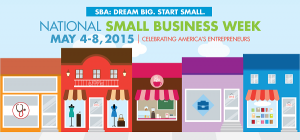By Meredith Wood
The term “SBA loan” is actually a misnomer. The Small Business Administration (SBA) itself doesn’t give out loans. Rather, the government organization serves to facilitate the relationship between lenders and borrowers.
This is a win/win for both parties. The SBA helps borrowers find a reputable lender, and it helps lenders minimize risk and be sure their loans will be paid back. The government makes this resource available to small business owners and lenders because small business is one of the most robust drivers of the American economy.
That said, there are specific requirements for participating in an SBA loan program:
1. Your business must have fewer than 500 employees. Anything larger and the business isn’t considered “small” anymore.
2. Your business must meet qualifications from specific lenders. The various lenders the SBA works with have different criteria. Finding the small business loan program you’d like to participate in is only the first step in obtaining funding.
National Small Business Week Special Report
Let’s take a look at the SBA’s most popular loan program. Here is everything you need to know about the 7(a) loan program:
The 7(a) Loan Program
7 (a) loans are used for starting, acquiring or expanding a small business. Here is a quick cheat sheet on the details of the program:
Borrowers use these loans for a number of things, such as:
- Short and long-term capital needs
- Purchasing equipment
- Purchasing real estate
- To construct or renovate
- To buy an established business
- Under certain circumstances, to refinance existing business debt
Maximum Loan Amount: $5 million
Minimum Loan Amount: None
Average Loan Amount (2012): $337,730
Fees (In certain instances, fees can be financed)
- Under $150,000: 0%
- $150,000 and up, one year or less: approx. 0.18% of total loan
- $150,000 to $700,000, more than a year: approx. 2.25% of total loan
- $700,000 and up: approx. 2.63% of total loan
Rates
- Base rate + spread
- Spread starts at 2.25% and depends on loan terms (Reference)
These are SBA loans with the most diverse potential uses, but there are some restrictions.
7(a) Loans cannot be used for:
- Refinancing debt where SBA is taking on a loss
- Buying an asset solely for speculation purposes
- Reimbursing the funds owed to any owner
- Affecting a partial change of business ownership
- Paying delinquent taxes
- Purposes not considered a “sound business purpose,” as defined by the SBA
The majority of small business owners who take a loan through the SBA loan program take out this flexible, multi-purpose loan. However, smaller businesses or businesses in special circumstances may be better served by one of the SBA’s more specialized loan programs, such as a 7(a) special purpose loan.
7(a) Special Purpose Loans
The 7(a) special purpose loans exist for businesses deemed “particularly advantageous” to the United States economy.
7(a) Special Purpose Loans are available to:
- Aid businesses impacted by the North American Free Trade Agreement (NAFTA)
- Provide financial assistance to Employee Stock Ownership Plans
- Help implement pollution controls
CAPLines (up to $5 million)
Contract Loan Program
- Finances the cost associated with contracts, subcontracts, or purchase orders
- Up to 10 year term
Seasonal Line of Credit Program
- Supports the buildup of inventory, accounts receivable, labor, or materials above normal usage for season
- Up to 5 year term
The Builders Line Program
- Provides funding for contractors to develop property for a third party that is not yet known
- 3 to 5 year term
The Working Capital Line of Credit Program
- Revolving line of credit providing short-term working capital
- Often used to extend credit to customers or used by companies whose main asset is large inventory
SBA Export Loan Programs
Export Express Loan Program
- Any purpose that will enhance a business’s export development
- Up to $500,000
Export Working Capital Program
- Fund export transactions from purchase order through to collections
- Up to $5 million
International Trade Loan Program
- Fund production of goods or service involved in international trade to develop and penetrate foreign markets
- Up to $5 million
Advantage Loans
Small/Rural Lender Advantage Loan
- For businesses located in rural community
- USDA provides guarantee
- Community Advantage Loan
- For businesses in underserved markets
- Lenient collateral and balance sheet requirements
If you’re an exporter, deal with large amounts of inventory, or fall into one of the other 7(a) special purpose loan categories, then the SBA is especially interested in ensuring your success with a loan. Your business has been deemed advantageous to the American economy and you should contact the SBA about how they can help your small business thrive.
If your business needs working capital, applying for an SBA loan is always a great place to start, as their interest rates are among the most affordable available to SMBs. However, be sure to consider many different loan products (like our friends at Fundbox) before moving forward with a specific lender.
Meredith Wood is the Editor-in-Chief at Fundera, an online marketplace for small business loans that matches business owners with the best funding providers for their business. Prior to Fundera, Meredith was the CCO at Funding Gates. Meredith is a resident Finance Advisor on American Express OPEN Forum and an avid business writer. Her advice consistently appears on such sites as SCORE, Fox Business, Amex OPEN, AllBusiness, and many more. Follow her at @Mere_Wood.








